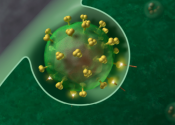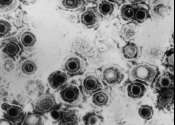Scientists zoom in on AIDS virus hideout
French scientists said Wednesday they had found a way to pinpoint elusive white blood cells which provide a hideout for the AIDS virus in people taking anti-HIV drugs.
Mar 15, 2017
0
86
French scientists said Wednesday they had found a way to pinpoint elusive white blood cells which provide a hideout for the AIDS virus in people taking anti-HIV drugs.
Mar 15, 2017
0
86

Investigators from Whitehead Institute, the Ragon Institute of MGH, MIT and Harvard and the Broad Institute of MIT and Harvard have used CRISPR-Cas9 gene-editing technology to identify three promising new targets for treatment ...
Dec 19, 2016
0
70

Tulane University researchers found some monkeys whose immune systems are depleted by the simian strain of HIV have a second line of defense against tuberculosis. The discovery could have significant impacts on future vaccines ...
Sep 6, 2016
0
68

Biologically speaking, we carry the outside world within us. The food we ingest each day and the trillions of microbes that inhabit our guts pose a constant risk of infection—and all that separates us from these foreign ...
Jun 13, 2016
0
111

Yale scientists have solved a puzzle of the immune system—how antibodies enter the nervous system to control viral infections. Their finding may have implications for the prevention and treatment of a range of conditions, ...
May 18, 2016
0
141

Researchers from the University of Illinois at Urbana-Champaign have developed a highly sensitive biosensor based on a differential immuno-capture technology that can detect sub-populations of white blood cells. As part of ...
Mar 11, 2016
0
29

A team of researchers, led by investigators at the University of Colorado School of Medicine, have identified a new class of antigens that may be a contributing factor to type 1 diabetes, according to an article published ...
Feb 11, 2016
0
160
Scientists from the Gladstone Institutes have discovered that blood-derived T cells are resistant to the chief cause of cell death in HIV infection. Instead, it is T cells in the lymphoid tissues that are most susceptible ...
Oct 14, 2015
1
429

In a discovery that is likely to rewrite immunology text books, researchers at UC Davis have found that early exposure to inflammatory cytokines, such as interleukin 2, can "paralyze" CD4 T cells, immune components that help ...
Aug 18, 2015
0
2345

A research team led by Weill Cornell Medical College scientists has discovered a way to limit replication of the most common form of HIV at a key moment when the infection is just starting to develop. The study, published ...
Jun 29, 2015
0
62
